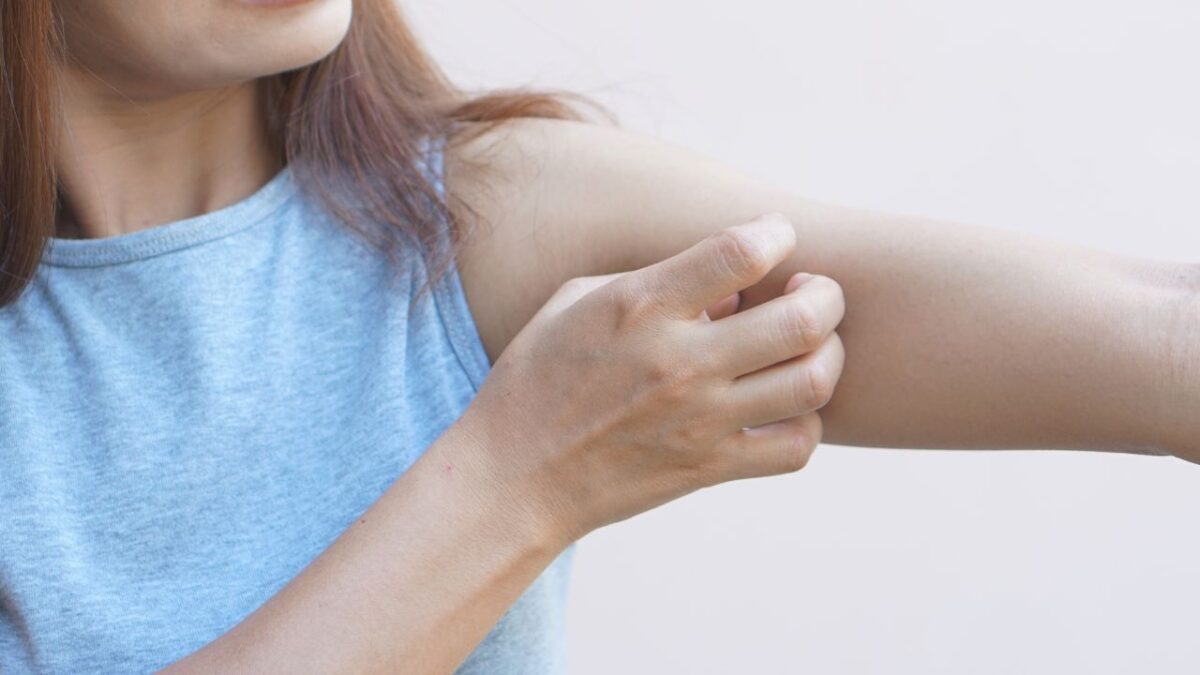Itchiness Related to Menopause: Understanding and Managing This Uncomfortable Symptom

Itchiness during menopause is a less discussed yet equally troubling symptom for many. This blog aims to shed light on the causes of menopausal itchiness, explore effective remedies, and provide support to those navigating this uncomfortable phase.
Itchiness in Menopause
Why Does Menopause Cause Itchiness?
As estrogen levels decline during menopause, the body undergoes significant changes that affect the skin, the body’s largest organ. Estrogen is crucial for maintaining the moisture and elasticity of the skin. Its reduced production leads to dryness and thinning, making the skin more susceptible to itching.
Hormonal Changes and Skin Sensitivity
The drop in estrogen that accompanies menopause can increase skin sensitivity and decrease its protective barrier function. This makes the skin more prone to irritation from environmental factors, such as harsh weather or allergens.
The Impact of Stress on Menopausal Skin
Menopause can be a stressful time, and stress can exacerbate skin issues, including itchiness. Stress triggers the release of cortisol, which further dries out the skin by impairing its barrier function, leading to increased sensitivity and irritation.
Managing Itchiness During Menopause
Practical Skincare Tips
Adopting a targeted skincare routine can alleviate and manage the dryness and itching experienced during menopause. Here are several effective strategies:
Hydration and Moisturization
Hydration is key. Drinking plenty of water and using a high-quality moisturizer can help maintain skin hydration from the inside out and the outside in. Look for products containing hyaluronic acid and ceramides, which help to retain moisture and repair the skin’s barrier.
Choosing the Right Skin Care Products
It’s essential to use gentle, fragrance-free products to avoid further irritation. Products formulated for sensitive skin or hypoallergenic options are ideal choices.
Home Remedies and Lifestyle Adjustments
Natural Oils and Supplements
Natural oils, such as coconut oil or jojoba oil, can be effective in moisturizing dry, itchy skin. Additionally, omega-3 supplements might help enhance the skin’s health, reducing dryness and improving its overall condition.
Humidifiers for Indoor Environments
Using a humidifier, especially in dry climates or during winter, can add moisture to the air, helping to prevent skin from drying out and becoming itchy.
When to Seek Medical Advice
If home remedies and lifestyle adjustments do not alleviate the itchiness, it may be time to consult a healthcare provider. They can offer prescriptions for topical ointments or hormone replacement therapy (HRT), which can effectively manage severe symptoms of menopause, including itchiness.
FAQs on Itchiness During Menopause
How common is itchiness among menopausal women?
Itchiness is a common symptom experienced by many women undergoing menopause, though it is not as frequently discussed as other symptoms like hot flashes.
What are the best types of fabrics for sensitive menopausal skin?
Breathable, natural fabrics like cotton are best. Avoid synthetic fabrics, as they can irritate the skin and exacerbate itching.
Can diet impact menopausal itchiness?
Yes, a diet rich in antioxidants and omega-3 fatty acids can help improve skin health and reduce dryness and inflammation.
Is itchiness during menopause temporary?
For many women, itchiness associated with menopause diminishes as their body adjusts to new hormone levels, though it may take some time.
What other symptoms might accompany itchiness during menopause?
Other symptoms can include dry skin, hot flashes, and hormonal changes that impact mood and sleep patterns.
Takeaway
Itchiness related to menopause, though uncomfortable and sometimes distressing, can be effectively managed through proper skin care, lifestyle adjustments, and medical treatments. Understanding the underlying causes and available remedies can empower women to navigate this natural transition more comfortably.
